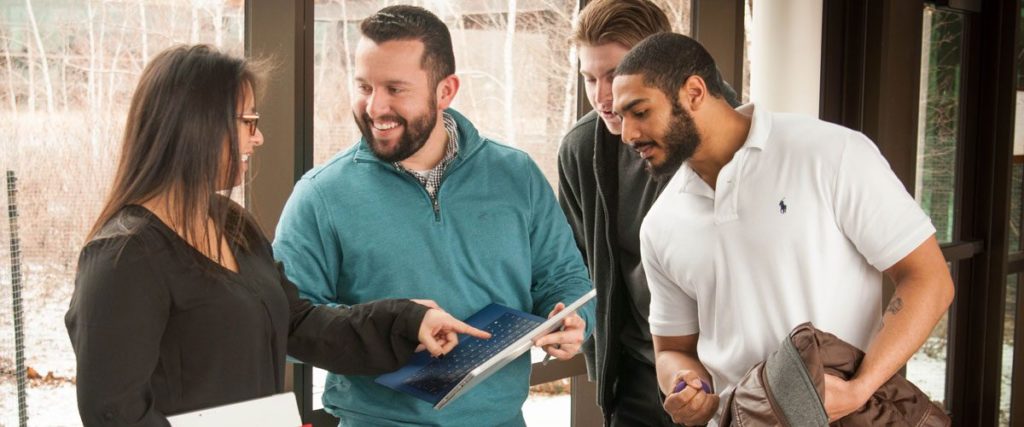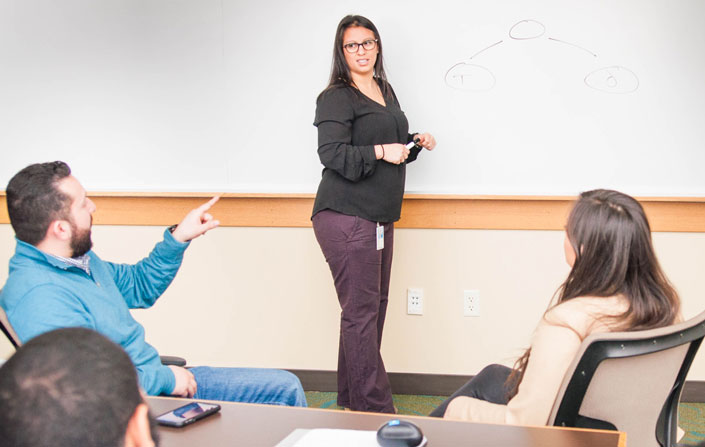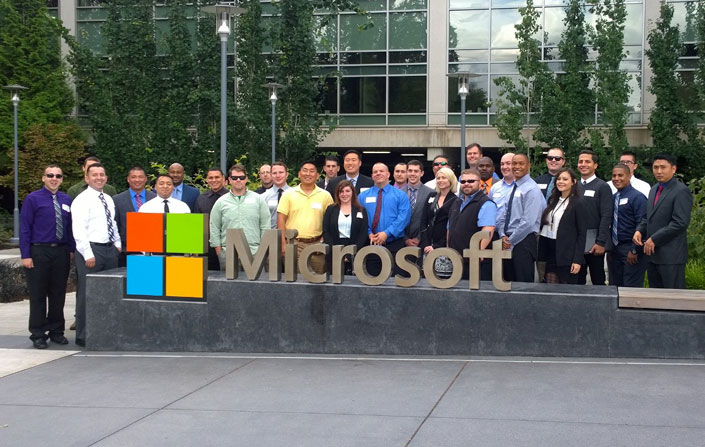Civilian mentors teach MSSA participants key career skills
Leaving the military for civilian life can be a difficult process, but Gina Kirby and Pamela Watson are determined to make it easier. Kirby and Watson are mentors for Microsoft Software & Systems Academy (MSSA), volunteering their time to coach service members who are training for civilian careers in the tech industry. Whether they’re reviewing resumes, scouring social media profiles or giving feedback on mock interviews, they are determined to help service members find well-paid, career-track positions.
“We’re literally changing people’s lives,” says Watson, who is a program manager in the Cloud and Enterprise Engineering Group for the Advanced Analytics Ecosystem and Enablement team. “And we are solving the problems that our company faces in hiring qualified tech workers, and the problems that these individuals face as they roll out of their jobs in the military. There is no finer reward as a volunteer; it’s probably the most rewarding work that I’ve ever done.”

MSSA is an intensive 18-week technology skills training program at multiple bases across the country for active duty service members with a scheduled separation date and honorably discharged service members. Classroom instruction and group projects give participants expertise and certifications that can lead to high-paying jobs in the tech industry. But to land those jobs, applicants must also write strong resumes and perform well in interviews. That’s where Kirby and Watson come in.
Working with members of MSSA cohorts over Skype, via email and during in-person sessions, business mentors from across Microsoft volunteer to provide guidance on career skills that are entirely different from the ones required in the military. The program includes weekly group meetings as well as unstructured, individual support between sessions.
Kirby and Watson help MSSA students create resumes that translate their military job skills into civilian terms — for example, providing context for a highly specific job title by listing core responsibilities, such as managing food supplies or providing supervision and training for combat soldiers. They walk through profiles on LinkedIn and Facebook, pointing out details that help build a professional image — or that might detract from it. They explain how civilian interview skills such as giving a firm handshake, smiling and making eye contact are different from the unemotional military demeanor that is expected from subordinates being issued orders. And they answer questions on virtually every aspect of civilian career life.
“They ask questions like, ‘Is this a good opportunity?’” Watson says. “’Should I take the first job that comes?’ ‘Do the offices have windows?’ ‘I hear the coffee is free?’ — simple, interesting little questions but also the big ones, life advice, like whether to relocate and move the family for a job. It’s a moment where these people have invited us into their lives, not just their professional evolution.”
“Something I remind cohorts to do throughout the course is take time for self-reflection” says Kirby. “This is a new career and what you will do after service deserves mindful consideration. It’s important to invest time in identifying what you really want to gain from your career, what you’re passionate about, and how to seek out and identify roles that will fulfill those for you”.

Becoming a mentor
Watson has done academic research and writing about military working dogs, so was delighted when she spotted a dog in uniform while attending a corporate conference. When she went to thank the dog and its handlers for their service, she noticed an information booth about the Microsoft Military Affairs program and wanted to learn more. She quickly found MSSA and was determined to be part of it.
“I reached out to the program team and said hey, I’m a 20-year business veteran, I work in the learning and development group and can prep people for resume review and mock interviews; I’d be happy to lend a hand,” Watson says. “And they replied and said OK, you’re in; can you be a mentor and lead a cohort beginning next week? I said sure, and jumped right in.”
Kirby, who is an Inside Opportunity Team Sales Manager with Inside Sales at Microsoft, was checking email when her opportunity to help presented itself.
“An email was sent to the women in our Public Sector vertical, of which I am formerly a part of: a request to volunteer for mentorship for the MSSA program,” Kirby says. “I responded immediately. I didn’t even know what I was signing up for, but I saw ‘Serve our veterans and active military members,’ and said, ‘I’m in.’”
Watson has now spent a year serving as a business mentor and a lead mentor, recruiting and managing the volunteers who provide tech coaching; Kirby recently saw her first MSSA cohort through graduation from its program and is now lead mentor for a new cohort. Both women are eager to keep helping new participants prepare themselves for civilian work. They’ll have plenty of opportunity as MSSA expands to new bases during 2016. By relying on Skype and phone conferences, Kirby is able to work with students from her office at Microsoft’s Fargo Telecenter. Watson, who works in Redmond, Wash., also uses Skype and email, and provides additional coaching on in-person interview skills when the students from outside the Northwest come to the main Microsoft campus for the in-person interviews that cap the program.
One thing she can’t teach, says Kirby, is the attitude required to stand out from the competition. But she doesn’t have to.
“These students are ready to enter the corporate world, and they have a huge appetite to learn,” Kirby says. “You can teach technical skills, but you can’t teach someone to be tenacious. I can’t force someone to be hungry for a job, to explore and consider a new career, take initiative and become a self-starter. It’s an inherent quality, and these people have it.”
What mentors get out of it
Watson and Kirby both put in significant time when MSSA programs are in session, especially as interviews draw near. Watson estimates she spends up to 10 hours per week as a mentor, on top of a demanding job and full-time studies at Northwest University’s College of Adult and Professional Studies. Kirby finds herself staying late on calls to make sure students’ questions are answered and they feel confident about their upcoming opportunities. She speaks with individuals outside business hours before interview days for final tips, tricks and to calm nerves. But both are happy to spend the time, because they can see the difference it makes to the program participants.

“I’m truly honored to participate,” Kirby says. “These people have dedicated their lives to serving our country, and I feel like this is an opportunity to give them something back. The ability to support them in an area I have experience and encourage them to feel empowered and prepared — I can’t speak enough to how much it means to help in some small way.”
Both Kirby and Watson have family members and loved ones who have served, so they see the personal importance of MSSA to service members who are transitioning to civilian life. Watson also sees that helping MSSA gives a strategic benefit to the tech industry and the company — an angle she likes to emphasize when she’s talking with Microsoft employees who are passionate about solving problems.
“I tell them there are two problems that we’re solving for,” Watson says. “First, in the United States of America we issue hundreds of thousands of H1B visas every year because there aren’t enough math and science students graduating from U.S. universities to fill the high-tech jobs that will solve the business problems of tomorrow through digital transformation. Then we have hundreds of thousands of military servicemen and women who have literally forged the umbrella of freedom beneath which we live, and too often, the best job opportunity that they’re going to have after as much as two decades of service is a minimum-wage job. What we are able to do in this program is give them and their families an entirely new future.”
